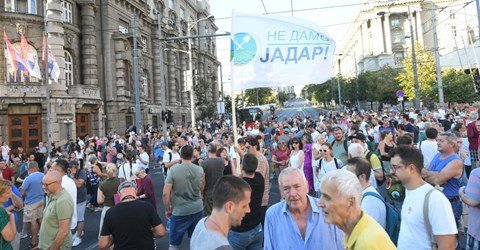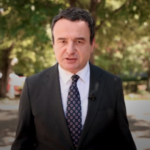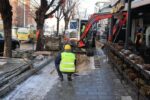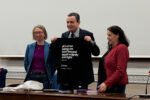The President of Serbia, Aleksandar Vučić, will address the public today at 11 AM following mass protests against lithium mining last night in central Belgrade, while protesters remain determined to block rail traffic.
Protesters at the massive rally against lithium mining blocked the railway hub in Prokop, Belgrade, and the railway station in New Belgrade last night. The highway through the capital, leading towards Niš and Zagreb, was also temporarily blocked.
In the early morning hours, the police surrounded citizens who had spent the entire night at the main Belgrade railway station in Prokop. Riot police dispersed the protesters who were blocking the tracks.
To recall, tens of thousands of people gathered on Saturday evening in central Belgrade to protest lithium mining, responding to a call from environmental organizations and movements. They demanded that the government pass a law permanently banning geological exploration and exploitation of lithium and boron in Serbia.
After the main rally in Belgrade’s Terazije, which was estimated to have around 40,000 participants, part of the protesters blocked two Belgrade railway stations, intending to stay until the Law on the Permanent Ban on Geological Exploration and Exploitation of Lithium and Boron in Serbia was adopted.
A smaller group blocked the highway in Belgrade, leading to an incident where one driver drove a car into the protesters. According to unconfirmed reports, three people were injured.
The Controversial Lithium Mine and Rio Tinto
The authorities in Serbia are facing increasing resistance to lithium mining after Belgrade signed a memorandum on July 19th with the European Union on strategic partnership in sustainable raw materials. This document triggered a new wave of almost daily protests across the country.
If implemented, the Jadar project of the multinational company Rio Tinto, worth $2.4 billion, could cover 90% of Europe’s current lithium needs and make Rio Tinto one of the leading global producers of this mineral, a key component in batteries for electric vehicles and mobile devices.
Serbian officials claim that the lithium mine would boost the economy and bring significant GDP growth, but environmentalists argue that the cost would be too high compared to the immeasurable damage to the environment and the local community in the agriculturally developed Jadar region in the west of the country.
Source: index.hr







